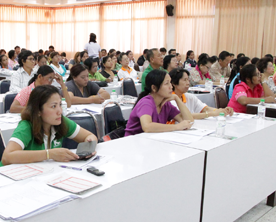C ompanies in Myanmar are in an ac-quisitive mood and are spreading their reach for talent in the glob-al marketplace. Most Myanmar based and Myanmar focused firms could, until recent-ly, count on an abundant supply of labour to support growth, but liberalisation and open-ing of the market and competition is creating an entirely new set of workforce rules and challenges. Bridging this talent gap in the newly emerging market of Myanmar is only going to get tougher.
Four-fifths of the senior leadership people in Myanmar surveyed for this article ( in two parts) expects domestic recruitment and retention of employees in their respective functions to grow increasingly more difficult over the next three years. In this context, Myanmar firms and companies who want to start operations in the Golden Land should embrace talent acquisition and talent man-agement as an integral part of their business approach.
The skill gap is widening
There is no shortage of workforce entrants in this market, but concerns run deep that their skills will not meet international com-panies’ requirements or standards. Half of the surveyed senior leadership people see a burgeoning gap between the skills and tal-ent domestic universities provide and what industries need, and believe this will exacer-bate talent shortages.
Given this skills environment, there is a need is to provide a fulfilling and challenging ca-reer path for employees. Companies need to up-skill their workforce and hone their technical skills by embracing training and devel-opment at the centre of their business.
A combination of factors contribute to this skill-gap including the gradual shifting of the economy from agricultural to an industrial and service-based economy, coupled with the fact that education and training institu-tions are not yet producing sufficient num-bers of graduates to meet the new demand for skills
Tun Thura Thet, CEO of Myanmar Informa-tion Technology, cites the example of Viet-nam, whose economy has transformed from one based on agriculture and commodities to one of manufacturing and services over a short period of time. “At each stage, the skill sets and knowledge of the workforce needs to evolve, often very rapidly”, said Mr Thet. “Just as they are switching the training fo-cus from agriculture to engineering, the real need here (Myanmar) is in marketing and T. It’s a real challenge.” Sourcing IT talent is highlighted as important for their organi-sation by nearly everyone I interviewed with some citing as “very important to critical”.
‘Soft’ skills are most desired but toughest to find While IT and other technical aptitudes are important to companies’ success, execu-tives see the ability to manage change and to think strategically as the skills most required among employees to take their firms forward over the next three to five years. But they also acknowledge that talent with these skills will be by far the toughest to find.
A strong employer brand is a powerful magnet for potential employees
Companies need to carefully consider the image they project and be clear about what they stand for. Nurturing loyalty to the com-pany’s brand and values will become an in-creasingly important factor in firms’ ability to attract, retain and manage employees in the coming days
Explore and adopt new approaches to sourcing talent Firms need to be more creative in where they find and how they foster talent. This could mean partnering with human capital firms to create a training consortium and even con-sidering outsourcing training and recruit-ment to managed services providers while ensuring that the pool of required skills con-tinues to grow; it could also mean partnering with talent capital firms to reach out to la-bour from remote villages to cities allowing for locals to re-enter the workforce through training and up skilling. With the prospect of talent shortages wors-ening in the coming years, locally-based companies should introduce talent-man-agement techniques such as mentoring and coaching, as well as performance manage-ment techniques that are widely used in ma-ture markets.
With young workforces, com-panies not only face the challenge of meeting expectations in a market where talent is in the driving seat, they are also finding that many new recruits lack the experience and knowledge needed to move them into more senior positions. The biggest problem, when it comes to talent shortages, is the increas-ing gap between what universities provide and what industries need, so companies also need to build close relationships with these institutions to help build a pipeline of skilled employees that can fill their talent gaps. At the same time, as companies expand their businesses, through mergers, joint ventures or through acquisitions, recruiting and de-veloping executives capable of managing change and thinking strategically will be-come a critical element.
Training and development therefore needs to be rolled out faster and more extensively. Many more companies need to recognize the need to establish the kind of flexible working policies seen in mature markets as their em-ployees start to focus on work-life balance is-sues. These talent-management techniques are to be adopted by more Myanmar based and focused companies in the coming years. Those that fail to address the talent challeng-es adequately will find it hard to sustain the rapid growth they have become accustomed to in other markets, but want to replicate in this newly opening economy and thereby might lose out the big opportunity.
Kevin Gomes is principal consultant with IMA Executive Search, an IMA Group Company which specializes in talent capital and man-agement services based in Yangon, Myanmar. He can be reached at kgomes@imaexec.com.










